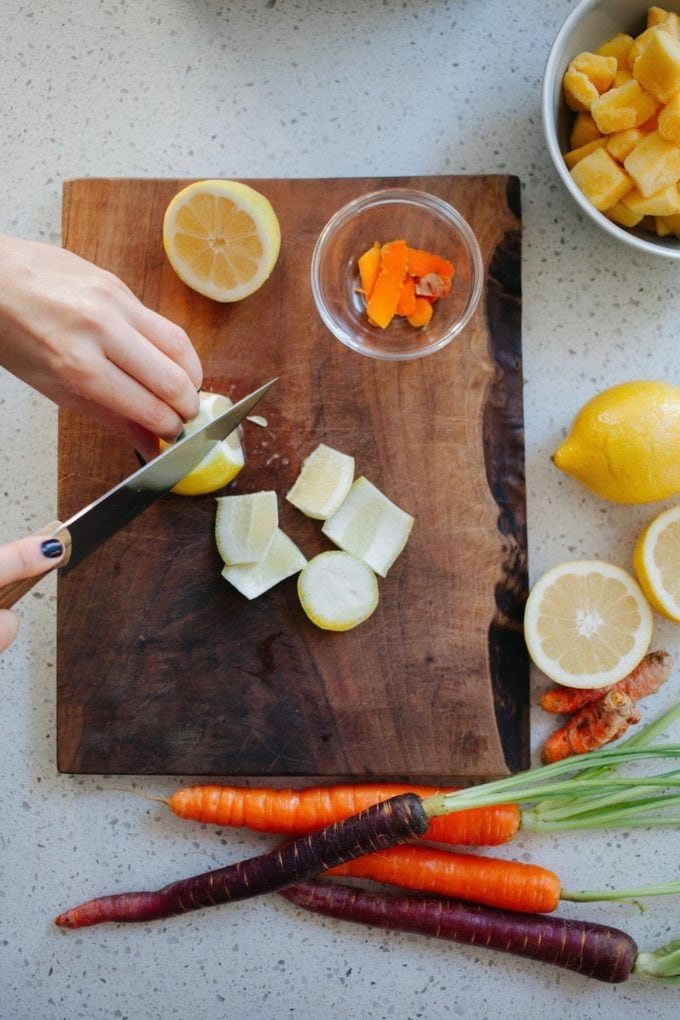The Lowdown on the Benefits of Lemon Water

Lemons are definitely one of the most popular citrus fruits in existence…but if you believe the internet, they are downright magical when squeezed into water. Can you believe the lemon water hype? I’m here to give you the lowdown on the benefits of lemon water.
The health benefits of lemon are typically overshadowed by their importance to cooking. Without a doubt, their fresh citrus taste is able to brighten up a wide variety of dishes and is well loved by many people around the world. I am a firm believer that almost any dish can be improved with a firm hit of lemon juice. But eating lemon is good for you too.
So…what are the health benefits of drinking lemon water?
You can’t scroll through your feed without someone sharing their daily lemon water routine. Is it really a liver-cleansing and detoxifying miracle? Not exactly.
Perhaps one of the strongest benefits of adding a bit of lemon juice in your water is that it may help you drink more water. Drinking a ton of water is one of the best ways to support better digestion, in addition to supporting your body’s natural detoxifying mechanisms (AKA peeing, pooping, sweating and breathing) and improve skin health. The gentle acidity of lemon water also tends to have a stomach settling effect. So it’s great if you wake up feeling a bit bloated. Or, if your stomach feels upset post-meal.
However, unless you’re blending two whole lemons into your water, you’re not going to drink significant amounts of vitamin C. Yep, seriously. A single lemon wedge only provides about 4% of your daily vitamin C intake! If you want a deeper look into this and a few more internet health myths, read this.
How much vitamin C in a lemon?
Lemons are not just bound by their flavour boosting abilities…they also have some health benefits. By far, the most highly concentrated nutrient found in lemons is vitamin C…but it has less than you might expect. One medium lemon, without the peel, has about 30mg of vitamin C. A kiwi, by contrast, has 71mg of vitamin C.
If you juice that lemon, you’ll get more of the vitamin C out of it, about 22mg. Lemon peel also has its own health benefits…one tablespoon of lemon peel has about 8mg of vitamin C.
To put this into perspective, men and women over the age of 19 years old need 90mg and 75 mg of vitamin C per day, respectively. In one lemon, you’ll also find 80mg of potassium to protect fluid balance and heart health, in addition to 15mg of calcium and 1.5 grams of fibre. Lemons also contain bioflavonoids and other anti-inflammatory compounds that support overall health.
What you’ve got to remember here, is that you’d have to eat the whole lemon to benefit from these nutrients. Which most of us don’t do.
Why do our bodies need vitamin C?
Vitamin C supports collagen development in the skin, immune function and helps improve iron absorption.
Since our bodies do not store extra vitamin C, we need to make sure that we eat vitamin C rich foods daily. Did you know that the best source of vitamin C is actually not from citrus fruits, but from bell peppers? Just a half cup of bell peppers exceeds the recommended daily amount of vitamin C you need in a day.
Can lemons help improve digestive health?
As I mentioned, the acidity of lemons can help you settle your stomach. They also have a tiny bit of fibre.
While not a high number, the majority of 1.5 g fibre in a lemon is pectin, a soluble fibre. Soluble fibre forms a gel in water that gently slows digestion. While that might not sound like a benefit, soluble fibre helps keep you fuller for longer, manage your blood sugar levels, and decrease blood cholesterol. Triple win.
Ways to get more lemons into your life
If you love lemon water, enjoy it! Just be sure to never brush your teeth post lemon water – that acidity can soften your enamel and you’ll literally brush it away.
But what if you want to go beyond lemon water? Lemons are my secret weapon for brightening the flavour of any dish, including green smoothies. If you find your smoothies are tasting a little dull and flat, blend in a whole slice of lemon (yes, with skin!) to improve their taste. I love boiling lemon and ginger slices for a warming sipper and squeeze lemon juice into many dishes to brighten the flavour without adding extra salt (and no, you don’t taste the lemon if you use just a bit…it just lifts the flavour of the dish!)
Fresh lemon juice is a constant in my salad dressing and sauces. You could also blend whole lemons and add the puree to muffins, loaves and even stews…anywhere you want that citrus lift.
Like any fruit, lemons are amazing. The nutrient benefits are great, and in combination with other fruits and veggies, the effect on health is even greater. But if lemon isn’t your thing, there are so many other fruits and veggies that you can eat to obtain your daily intake of vitamin C. Try strawberries, guava, kiwis, oranges, lychee, pineapple, bell peppers, broccoli, cabbage and more.
A big thank you to my student, Gloria Sun, for her support in putting this article together!
Photo Credit Joey Armstrong



